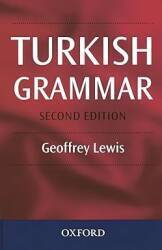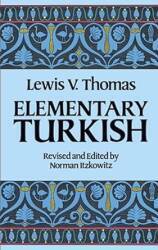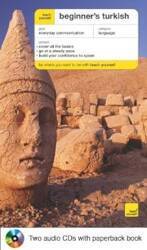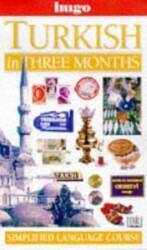
Basics of Turkish Grammar
Background and Introduction
Authoritative References for Turkish Grammar
Get some good reference books, these pages are just intended to be study guides. The first book I found was Elementary Turkish, by Lewis V. Thomas, Dover Publications, 1967, ISBN 0-486-25064-4. It's a good book — if you want to try to teach yourself Turkish it might be the place to start, as it's commonly available and reasonably priced. You can buy it from Amazon.
I later found Turkish Grammar by Geoffrey L. Lewis, Oxford University Press, 1991, ISBN 0-19-815838-6. It would be the second grammar book to read if you're considering using both. If you have to pick just one, this would be it.
Thomas' Elementary Turkish is a lighter treatment with far less detail, not just in what it covers but in the crucial explanations. It will give you a very brief description of a concept and then provide an example.
Lewis' Turkish Grammar has, to me, far better descriptions. He has much more prose explaining a given concept, and then he usually provides multiple examples, maybe showing how some mechanism works under different situations of vowel harmony combinations. He then often provides one or a few example sentences demonstrating the concept, those sentences taken from practical sources like Turkish newspapers or books.
I also find Lewis' Turkish Grammar much more readable. In Elementary Turkish you find the notations V2 and V4 used to indicate "The variable vowel e/a" and "the four-variable vowel shown in the following table", respectively. But in Turkish Grammar those are much more simply and memorably referred to as "e-type" and "i-type", respectively.
I also found that much earlier versions of these pages, based much more heavily on Thomas' book, brought me far more frequent reports of poor descriptions and errors from actual Turks. I could paraphrase or even quote Thomas, and a Turk would say "No, that's wrong", or "While that might be correct according to some grammar rule, a Turk would never say that." While that still happens from time to time with the current pages, now it's because I have made an error or neglected to include Lewis' reasoning for why he presented something in some particular way.
Of course, I still struggle to keep the authors' names straight — Lewis Thomas versus Geoffrey Lewis!
The Turkish language is highly organized and lends itself to the construction of tables. Turkish appeals to computer geeks who figure that anything defined by a rigid grammar can be wrestled to the ground given enough organization (Although figuring out how görüştürülmek means to be made to converse with one another is non-trivial). It's also pretty handy if you worry that you might suddenly be teleported to some random spot on the surface of the Earth. You could travel overland from the Aegean Sea to the Great Wall of China, and speak some Turkic language or dialect to the locals the entire way.
Mind you, Spanish also covers a lot of ground, and Chinese includes a lot of people. But Turkish has practical application way beyond languages like Estonian or Basque or Esperanto.
Background of Turkish
Turkish is an agglutinative language, a big word meaning that words have suffixes, possibly several, appended to reflect case and number (for nouns and pronouns) or conjugation (for verbs). So, these pages are mostly collections of tables of suffixes, particularly for the verbs. I've been told that the technical term is actually morphotactics.
This means that this collection of pages might be somewhat mislabeled. Yes, there is some discussion of grammar here — topics like word order and relationships between words or phrases of a sentence, the syntax of the language. But the bulk of the material is about inflection — how words are modified when they play different roles. Inflection includes conjugation of verbs (I run, I am running, I was running, I ran, I had run, and so on) and inflection of nouns and pronouns (I, me, my, mine, and so on, and note that English mostly leaves nouns uninflected).
Other than a few quirky characters, like that undotted "ı", Turkish is fairly straightforward. Like Russian:
- There are no definite versus indefinite articles to mix up.
- When discussing states of existence or character, verbs aren't even needed.
-
Words are spelled phonetically — other than
which syllable to stress, you know how to pronounce
a previously unseen word.
- OK, nothing is perfect, Russian and Turkish orthography included. Written Turkish may leave out diacritical marks, and G.L. Lewis describes many regional quirks and Persian and Arabic leftovers. And in Russian, as someone reminded me: "Vowel reduction causes native speakers to mix up е, и, and я. Consonant assimilation is not reflected in written language in most cases. In words like чувство and бездна, not all letters are pronounced." Plus, его is pronounced as if it were spelled ево, and so on. But both are far more phonetic than English!
Other advantages of Turkish:
- Turkish is extremely regular when compared to other languages, especially the horrible mess of English. Authors of grammar texts tend to make sweeping statements about there being no irregularities, or no irregularities outside one or a very few examples, but Turks will quickly tell you that there are some irregularities. Many thanks to Fatih Aygün for some wonderfully explained examples that I will include at the end of the sections about pronouns, nouns, adjectives and verbs.
- There is no gender.
- The third person singular pronoun o means "he", "she", and "it" equally. So, everyone agonizing over the acceptable form for "he versus she", let alone zie and zhe and xe and so on, should learn Turkish immediately and use it exclusively.
- There is no distinction between adjectives and adverbs — one word serves both purposes. No good versus well mixups.
There are a few minor disadvantages and difficulties:
-
Turkish is not Indo-European, so don't expect most words
to even vaguely resemble words from European languages.
Except of course for:
- The large number of words borrowed from European languages, largely French, e.g. jandarma, trengar, otogar, etc.
- The words European languages borrowed from Turkish, especially Russian borrowing from various Turkic languages from its central Asian empire. And then there's Russian киоск, which the Russians got from the French kiosk, which the French got from the Turkish kösk.
- The large number of words borrowed from Arabic by both European languages and Turkish (although Turkish borrowed many more that didn't make it further west).
-
Semantics is a very different (and very difficult!)
problem.
According to my Redhouse Portable Dictionary,
, the light purple 16x12x5 cm edition
of the Redhouse line of dictionaries,
the Turkish word vurgun means:
- 1 adj — in love with, smitten with, struck on, sweet on
- 2 noun — ill-gotten gain, gravy
- 3 noun — profiteering, swindle, instance of swindling
- 4 adj — struck, blighted, damaged
- 5 noun — the bends, caisson disease, the chokes, the staggers, aeroembolism, air bends
- vurgun vurmak verb — to pull a deal, make a killing (by swindling someone)
- vurgun yemek verb — to be crippled from the bends, to die from the bends
- Words can get awfully long, with all the meaning buried in the sequence of suffixes piled together in a particular order.
One word of warning — there are undoubtedly many mistakes in the following. If you spot any, please send me a note so I can correct this!
Other good books:
Rosetta Stone leads the industry, their Turkish language pack is very popular.
Teach Yourself Beginner's Turkish Audiopackage is a good package. It's by A. Ç. Pollard and D. Pollard, NTC, 1996, ISBN 0-8442-3715-9, and it's available from Amazon. It also has a web site.
Another is Turkish in Three Months. Someone described it to me as "It really should be titled "Turkish Suffixes" as it is organized by suffix. While the index should be 6 pages instead of 3, it is a great reference book."
Instructional web sites
Ahmet Toprak wrote some articles on etymology.
Necla Bal's Online Turkish site has education at beginner and intermediate levels.
John Guise's web site includes " Turkish Language Explained for English Speakers.
Ruth Irwin runs the Totally Turkish learning web site.
Turkish natural-language processsing library Zemberek
Zemberek is a project to morphologically analyze Turkish words. It is hosted on GitHub, code.google.com, and Google's App Engine.
On-line Turkish-English dictionaries
The obvious place to start is Google Translate. Wikipedia includes some lists of Turkish nouns and verbs. Also see the Sesli Sözlük and Dictionarist projects. There's an on-line Webster's Turkish-English dictionary, although its coverage seems very limited and its behavior can be strange.
Web pages to test your reading skills
Fortunately, newspaper articles are written to grade-school reading levels. Unfortunately, it seems that Turkish grade-school kids are far smarter than me. Try these: Hurriyet newspaper, Hurriyet's Turkish-language USA edition, and Sabah newspaper.
Music and dialog for listening
ListenLive.eu as a long list of Turkish radio station streaming live on the Internet.
You can also find some Turkish radio stations at radio-locator, comfm, and Creatonic.




